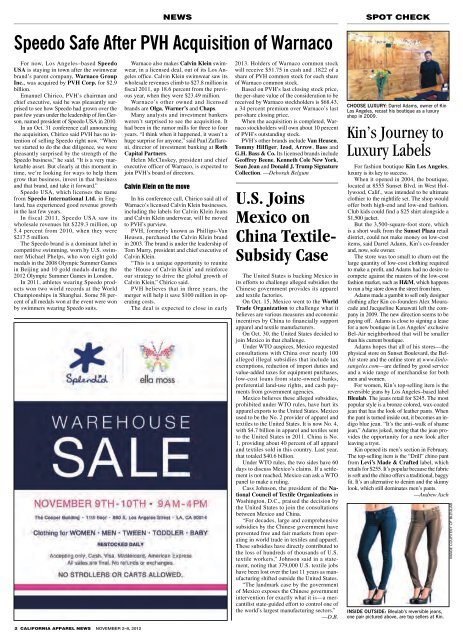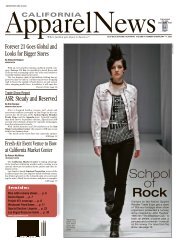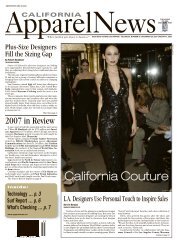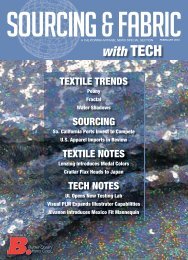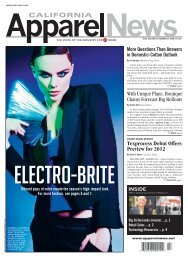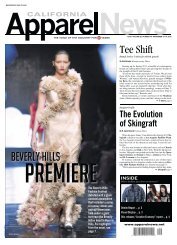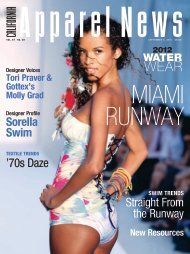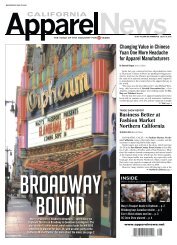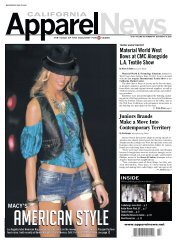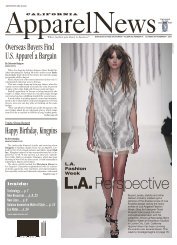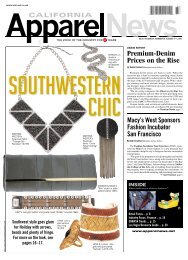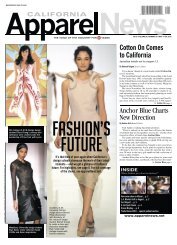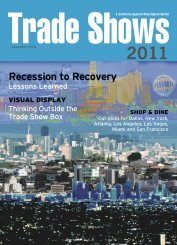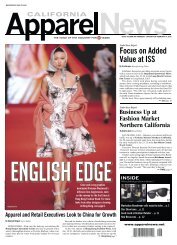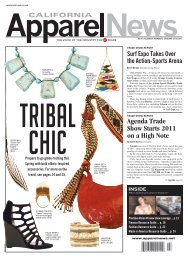Men's Fashion Week: Is LA Ready? - California Apparel News
Men's Fashion Week: Is LA Ready? - California Apparel News
Men's Fashion Week: Is LA Ready? - California Apparel News
Create successful ePaper yourself
Turn your PDF publications into a flip-book with our unique Google optimized e-Paper software.
For now, Los Angeles–based Speedo<br />
USA is staying in town after the swimwear<br />
brand’s parent company, Warnaco Group<br />
Inc., was acquired by PVH Corp. for $2.9<br />
billion.<br />
Emanuel Chirico, PVH’s chairman and<br />
chief executive, said he was pleasantly surprised<br />
to see how Speedo had grown over the<br />
past few years under the leadership of Jim Gerson,<br />
named president of Speedo USA in 2010.<br />
In an Oct. 31 conference call announcing<br />
the acquisition, Chirico said PVH has no intention<br />
of selling Speedo right now. “When<br />
we started to do the due diligence, we were<br />
pleasantly surprised by the strength of the<br />
Speedo business,” he said. “It is a very marketable<br />
asset. But clearly at this moment in<br />
time, we’re looking for ways to help them<br />
grow that business, invest in that business<br />
and that brand, and take it forward.”<br />
Speedo USA, which licenses the name<br />
from Speedo International Ltd. in England,<br />
has experienced good revenue growth<br />
in the last few years.<br />
In fiscal 2011, Speedo USA saw its<br />
wholesale revenues hit $229.3 million, up<br />
5.4 percent from 2010, when they were<br />
$217.5 million.<br />
The Speedo brand is a dominant label in<br />
competitive swimming, worn by U.S. swimmer<br />
Michael Phelps, who won eight gold<br />
medals in the 2008 Olympic Summer Games<br />
in Beijing and 10 gold medals during the<br />
2012 Olympic Summer Games in London.<br />
In 2011, athletes wearing Speedo products<br />
won two world records at the World<br />
Championships in Shanghai. Some 58 percent<br />
of all medals won at the event were won<br />
by swimmers wearing Speedo suits.<br />
2 CALIFORNIA APPAREL NEWS November 2–8, 2012<br />
Warnaco also makes Calvin Klein swimwear,<br />
in a licensed deal, out of its Los Angeles<br />
office. Calvin Klein swimwear saw its<br />
wholesale revenues climb to $27.8 million in<br />
fiscal 2011, up 18.6 percent from the previous<br />
year, when they were $23.49 million.<br />
Warnaco’s other owned and licensed<br />
brands are Olga, Warner’s and Chaps.<br />
Many analysts and investment bankers<br />
weren’t surprised to see the acquisition. It<br />
had been in the rumor mills for three to four<br />
years. “I think when it happened, it wasn’t a<br />
huge surprise for anyone,” said Paul Zaffaroni,<br />
director of investment banking at Roth<br />
Capital Partners.<br />
Helen McCluskey, president and chief<br />
executive officer of Warnaco, is expected to<br />
join PVH’s board of directors.<br />
Calvin Klein on the move<br />
NEWS SPOt ChECk<br />
Speedo Safe After PVH Acquisition of Warnaco<br />
In his conference call, Chirico said all of<br />
Warnaco’s licensed Calvin Klein businesses,<br />
including the labels for Calvin Klein Jeans<br />
and Calvin Klein underwear, will be moved<br />
to PVH’s purview.<br />
PVH, formerly known as Phillips-Van<br />
Heusen, purchased the Calvin Klein brand<br />
in 2003. The brand is under the leadership of<br />
Tom Murry, president and chief executive of<br />
Calvin Klein.<br />
“This is a unique opportunity to reunite<br />
the ‘House of Calvin Klein’ and reinforce<br />
our strategy to drive the global growth of<br />
Calvin Klein,” Chirico said.<br />
PVH believes that in three years, the<br />
merger will help it save $100 million in operating<br />
costs.<br />
The deal is expected to close in early<br />
2013. Holders of Warnaco common stock<br />
will receive $51.75 in cash and .1822 of a<br />
share of PVH common stock for each share<br />
of Warnaco common stock.<br />
Based on PVH’s last closing stock price,<br />
the per-share value of the consideration to be<br />
received by Warnaco stockholders is $68.43,<br />
a 34 percent premium over Warnaco’s last<br />
per-share closing price.<br />
When the acquisition is completed, Warnaco<br />
stockholders will own about 10 percent<br />
of PVH’s outstanding stock.<br />
PVH’s other brands include Van Heusen,<br />
Tommy Hilfiger, Izod, Arrow, Bass and<br />
G.H. Bass & Co. Its licensed brands include<br />
Geoffrey Beene, Kenneth Cole New York,<br />
Sean Jean and Donald J. Trump Signature<br />
Collection. —Deborah Belgum<br />
U.S. Joins<br />
Mexico on<br />
China Textile-<br />
Subsidy Case<br />
The United States is backing Mexico in<br />
its efforts to challenge alleged subsidies the<br />
Chinese government provides its apparel<br />
and textile factories.<br />
On Oct. 15, Mexico went to the World<br />
Trade Organization to challenge what it<br />
believes are various measures and economic<br />
incentives by China to financially support<br />
apparel and textile manufacturers.<br />
On Oct. 30, the United States decided to<br />
join Mexico in that challenge.<br />
Under WTO auspices, Mexico requested<br />
consultations with China over nearly 100<br />
alleged illegal subsidies that include tax<br />
exemptions, reduction of import duties and<br />
value-added taxes for equipment purchases,<br />
low-cost loans from state-owned banks,<br />
preferential land-use rights, and cash payments<br />
from government agencies.<br />
Mexico believes these alleged subsidies,<br />
prohibited under WTO rules, have hurt its<br />
apparel exports to the United States. Mexico<br />
used to be the No. 2 provider of apparel and<br />
textiles to the United States. It is now No. 4,<br />
with $4.7 billion in apparel and textiles sent<br />
to the United States in 2011. China is No.<br />
1, providing about 40 percent of all apparel<br />
and textiles sold in this country. Last year,<br />
that totaled $40.6 billion.<br />
Under WTO rules, the two sides have 60<br />
days to discuss Mexico’s claims. If a settlement<br />
is not reached, Mexico can ask a WTO<br />
panel to make a ruling.<br />
Cass Johnson, the president of the National<br />
Council of Textile Organizations in<br />
Washington, D.C., praised the decision by<br />
the United States to join the consultations<br />
between Mexico and China.<br />
“For decades, large and comprehensive<br />
subsidies by the Chinese government have<br />
prevented free and fair markets from operating<br />
in world trade in textiles and apparel.<br />
These subsidies have directly contributed to<br />
the loss of hundreds of thousands of U.S.<br />
textile workers,” Johnson said in a statement,<br />
noting that 379,000 U.S. textile jobs<br />
have been lost over the last 11 years as manufacturing<br />
shifted outside the United States.<br />
“The landmark case by the government<br />
of Mexico exposes the Chinese government<br />
intervention for exactly what it is—a mercantilist<br />
state-guided effort to control one of<br />
the world’s largest manufacturing sectors.”<br />
—D.B.<br />
CHOOSE LUXURY: Darrel Adams, owner of Kin<br />
Los Angeles, recast his boutique as a luxury<br />
shop in 2009.<br />
Kin’s Journey to<br />
Luxury Labels<br />
For fashion boutique Kin Los Angeles,<br />
luxury is its key to success.<br />
When it opened in 2004, the boutique,<br />
located at 8555 Sunset Blvd. in West Hollywood,<br />
Calif., was intended to be ultimate<br />
clothier to the nightlife set. The shop would<br />
offer both high-end and low-end fashion.<br />
Club kids could find a $25 shirt alongside a<br />
$1,500 jacket.<br />
But the 3,500-square-foot store, which<br />
is a short walk from the Sunset Plaza retail<br />
district, could not make money on low-cost<br />
items, said Darrel Adams, Kin’s co-founder<br />
and, now, sole owner.<br />
The store was too small to churn out the<br />
large quantity of low-cost clothing required<br />
to make a profit, and Adams had no desire to<br />
compete against the masters of the low-cost<br />
fashion market, such as H&M, which happens<br />
to run a big store down the street from him.<br />
Adams made a gambit to sell only designer<br />
clothing after Kin co-founders Alex Mouracade<br />
and Jacqueline Kanawati left the company<br />
in 2009. The new direction seems to be<br />
paying off. Adams is close to signing a lease<br />
for a new boutique in Los Angeles’ exclusive<br />
Bel-Air neighborhood that will be smaller<br />
than his current boutique.<br />
Adams hopes that all of his stores—the<br />
physical store on Sunset Boulevard, the Bel-<br />
Air store and the online store at www.kinlosangeles.com—are<br />
defined by good service<br />
and a wide range of merchandise for both<br />
men and women.<br />
For women, Kin’s top-selling item is the<br />
reversible jeans by Los Angeles–based label<br />
Bleulab. The jeans retail for $245. The most<br />
popular style is a bronze colored, wax-coated<br />
jean that has the look of leather pants. When<br />
the pant is turned inside out, it becomes an indigo<br />
blue jean. “It’s the anti–walk of shame<br />
jean,” Adams joked, noting that the jean provides<br />
the opportunity for a new look after<br />
leaving a tryst.<br />
Kin opened its men’s section in February.<br />
The top-selling item is the “Drill” chino pant<br />
from Levi’s Made & Crafted label, which<br />
retails for $255. It’s popular because the fabric<br />
is soft and the chino offers a traditional, baggy<br />
fit. It’s an alternative to denim and the skinny<br />
look, which still dominates men’s pants.<br />
—Andrew Asch<br />
INSIDE OUTSIDE: Bleulab’s reversible jeans,<br />
one pair pictured above, are top sellers at Kin.<br />
Image courtesy of BleulaB


